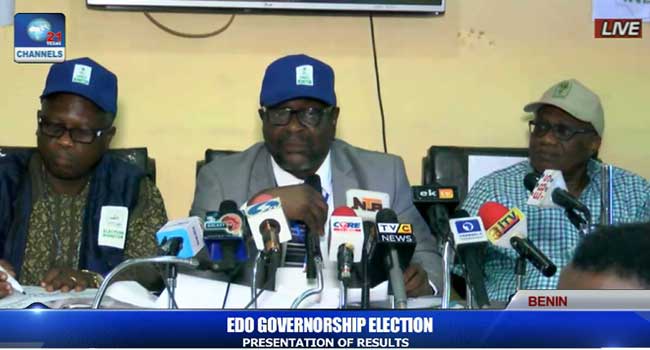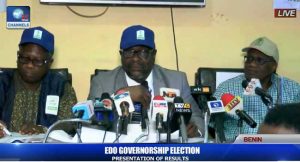
September 28 was a day to look forward to for residents of Edo State, with so much zest by the electorates to choose the successor of Governor Adams Oshiomhole.
He had ruled Edo State for about eight years, securing maximum two tenures as governor.
The election initially scheduled to hold on September 10 was shifted after security agencies advised the electoral body, the Independent National Electoral Commission (INEC), to shift the election, raising security concerns.
Prior to the postponement, the electoral body had said it would not shift the election, but later accepted the advice of the security agencies.
Inconclusive Election Fears
INEC has conducted several elections after the former Chairman of the Commission, Professor Attahiru Jega, left office after the general elections of 2015. Most of the elections were declared inconclusive.

The recurrence of inconclusive elections in different states since the new chairman of INEC, Mahmood Yakubu, took over, has triggered concerns, with analysts expecting possible inconclusive election in Edo State, having considered the weight that the candidates of the Peoples Democratic Party (PDP), Osagie Ize-Iyamu and that of the All Progressives Congress (APC), Godwin Obaseki, pull in the state.
Electorates in Edo State had filed out in their numbers on Wednesday, September 28, to choose their next governor. It was one of its kind, an election holding on a weekday.
Electorates in Nigeria are used to weekend voting, but this Edo Election is peculiar, with so much expected from the electoral body that had been offered an opportunity in the postponement to perfect its strategies to give the people of Edo State a free, fair and credible election.
Voting began early enough, with INEC holding on to its new strategy – simultaneous accreditation and voting.
Voting ended pretty well and in good time in most polling units and votes were counted at the locations with voters waiting to get the results of the votes before leaving.
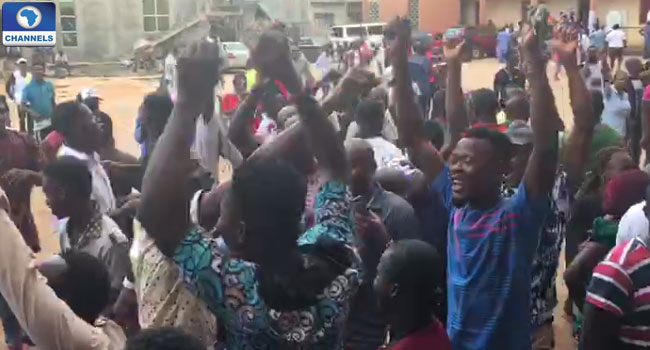
With the process running smoothly till evening, observers and reporters expected that the collation of results would begin few hours later at the headquarters of the INEC in the state’s capital, Benin City, but that did not happen.
Gradually, their patience waned, some voters could no longer wait, while reporters resorted to watching movies at the headquarters of INEC where they were waiting.
Voters that had become nervous over the delay in return of materials from the local councils began to gather at the headquarters of INEC questioning why there was delay in return of the ballot papers for final collation and result announcement.
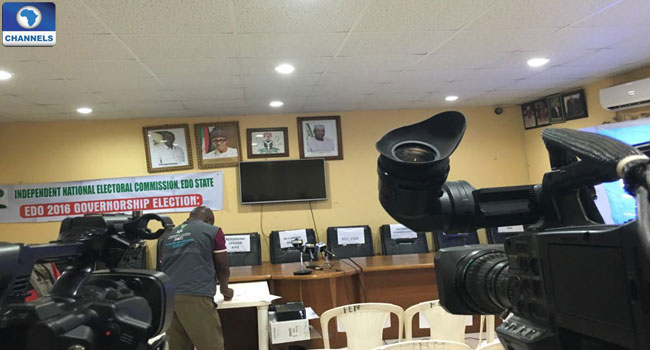
Despites the assurance of an INEC National Commissioner, Solomon Soyebi, that some results were ready, none came in till Thursday morning.
“From tracking we know that some results are ready,” he said, but none came in.
The All Progressive Grand Alliance (APGA) and the PDP raised concerns.
While APGA called for total cancelation of the process, the PDP claimed that the incumbent Governor, Adams Oshiomhole of the APC and INEC planned to rig the election at the collation centre.
While these claims were made, the delay compounded issues, leaving most Nigerians awake through the night.
Patiently they waited for the results which came in on Thursday.
Some minutes after 12 midnight, Channels Television’s political correspondent in Benin City, Seun Okinbaloye, said some vehicles moved into INEC Headquarters blaring siren. “It appears they have some results,” Seun said.
Collation of results began later that morning, leading to the announcement of Godwin Obaseki as the winner of the election.
Mr Obaseki of the APC polled 319,483 votes while the candidate of the PDP, his closest rival, for 253,173 votes.
The result ended expectations that the election could be declared inconclusive, but did not end claims by opposition parties that the result was manipulated.
With the results announced, it was time for Nigerians to react to the process and performance of INEC in the governorship election that sought of ended an inconclusive election jinx.
A poll was initiated by Channels Television on Twitter and over 5,000 Twitter users voted in the poll that began hours after the election result was announced.
The Poll Result
#EdoDecides: What do you think of @INECNigeria conduct of the Edo State Governorship Election?
— Channels Television (@channelstv) September 29, 2016
After voting ended, 30 per cent of voters rated INEC EXCELLENT while another 30 per cent rated the electoral body FAIR.
Twenty-six per cent of the voters rated the electoral body POOR while another 14 per cent was INDIFFERENT.
From the ratings, the INEC, which was gradually becoming famous for its consistency in declaring elections inconclusive, has gladdened spectators with its performance in the Edo State election.
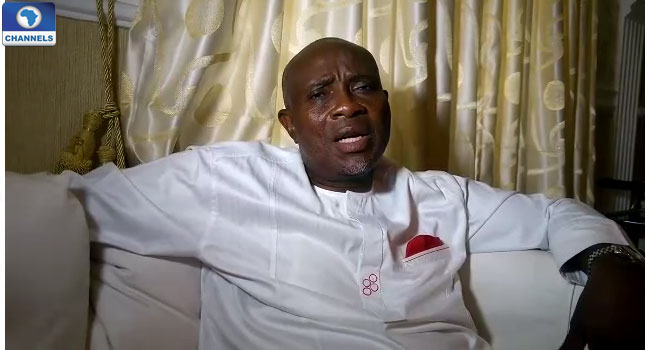
The election has come and gone, but some political parties that participated in the process have continued to express their displeasure with the process.
The opposition Peoples Democratic Party, which the APC has described as a ‘bad loser‘ is ready to go to the Tribunal to contest the result of the governorship election.
Expressing their displeasure with the process some residents and supporters of the PDP had held protests after the result was declared, claiming that there were irregularities that flawed the process.
War of words have continued over the election process, but this is not new to Nigerians’ as Nigeria’s elections are usually characterised by post-election Tribunal cases, a ‘deja-vu’ that may follow the governorship election of Edo State that was largely adjudged peaceful by observers.

